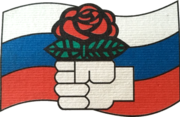Russian United Social Democratic Party Российская объединённая социал-демократическая партия | |
|---|---|
 | |
| Abbreviation | ROSDP |
| Leader | Mikhail Gorbachev |
| Founded | 11 March 2000 |
| Registered | 29 May 2000 |
| Dissolved | 24 November 2001 |
| Merger of | Social Democrats Social Democratic Union Russian Democratic Reform Movement Social Liberal Party of Russia Labor Party New Left |
| Preceded by | Congress of Social Democratic Forces |
| Succeeded by | Social Democratic Party of Russia (United) |
| Headquarters | Moscow, Russia |
| Youth wing | Russian Social-Democratic Union of Youth |
| Membership (2001) | 13,000[1] |
| Ideology | Social democracy |
| Political position | Centre-left |
| Colours | Red |
| Website | |
| rosdp.ru (archive) | |
The Russian United Social Democratic Party (Russian: Российская объединённая социал-демократическая партия, romanized: Rossiyskaya ob"yedinennaya sotsial-demokraticheskaya partiya; ROSDP) was a short-lived Russian center-left political party led by Mikhail Gorbachev, the former president of the USSR. The party included representatives on an individual basis:
- the Social Democrats movement;[2]
- Social Democratic Union;[2]
- The Russian Democratic Reform Movement;[2]
- Social Liberal Party of Russia;[2]
- the New Left movement;[2]
- Labor Party, etc.[2]
In 2001, the party merged with the RPSD in the Social Democratic Party of Russia[3]
YouTube Encyclopedic
-
1/3Views:60 5092 076181 555
-
The Nordic Model of Social Democracy: A Conversation with Swedish Prime Minister Stefan Löfven
-
History Two-Party Democratic Republican System Explained United States Democrats Republicans Origin
-
Class9 History Chapter2|Socialism in Russia-Socialism in Europe and the Russian Revolution
Transcription
History
At the beginning of 2000, the leaders and representatives of a number of social democratic parties and organizations decided to appeal to the former President of the USSR M. Gorbachev with an appeal to unite and lead the social democratic movement in Russia. The moment was not chosen by chance: on the one hand, there was a complete crisis of Russian social democracy, and on the other hand, with Yeltsin's departure from the Russian political arena, Gorbachev's return to it became quite possible.[4]
On March 11, 2000 M. Gorbachev headed the Russian United Social Democratic Party (ROSDP), which managed to unite in its ranks representatives of about twelve social democratic parties and organizations.[5] The leadership of the ROSDP includes representatives of the former SDPR (B. Orlov), the RSDS (B. Guseletov, A. Lukichev), the Social Democrats movement (G. Popov), the International Union (A. Mikitaev) and others. The ROSDP declared itself the heir to the traditions of the RSDLP (Mensheviks). The ROSDP came out against "liberal fundamentalism, the implementation of which has led the country to decline in the last ten years," and against the strategy of catch-up modernization for Russia.[6][4]
The party was officially registered on May 29, 2000[7]
In 2001, the Party of Social Democracy (PSD) of the Governor of the Samara Region Konstantin Titov joined the initiative of Mikhail Gorbachev. The design and estimate documentation was created by one of the former architects of perestroika (now deceased) A.N. Yakovlev, who switched to radical reformist positions during the Yeltsin era. At the beginning of its activity, the PSD positioned itself as a right-wing liberal party. But with the arrival of K. Titov in the party, the PSD began to evolve towards the "new" European Social Democracy, standing on the positions of the Manifesto of T. Blair and G. Schroeder "Europe: The Third Way." After a series of consultations, an agreement was reached on the creation of a united social democratic party on the basis of the ROSDP and the PSD.[4]
On November 25, the parties officially merged into the Social Democratic Party of Russia[8]
References
- ^ https://www.newsru.com/russia/24feb2001/part_sovet.html Политкомитет РОСДП обсудит сегодня подготовку к перерегистрации партии
- ^ a b c d e f https://www.ng.ru/politics/2000-03-14/3_party.html Еще одна новая партия
- ^ https://echo.msk.ru/programs/beseda/14193/ Объединение партии РПСД с партией РОСДП Михаила Горбачева, создание социал-демократической партии парламентского типа. Усиление контроля
- ^ a b c https://web.archive.org/web/20160305022635/http://ni-journal.ru/archive/4ca2193e/n-1-2010/a3164b50/6c040e57/ Становление социал-демократии в современной России
- ^ Крук Н., Даудерштадт М., Герритс А. Социал-демократия в Центральной и Восточной Европе. Интеграция–Примирение–Стагнация. Русское издание / Под ред. Б.Гуселетова. М.: Культурная революция, 2004. 128 с.
- ^ Социал-демократическая альтернатива для России. Материалы «круглого стола» с участием Председателя РОСДП М.С. Горбачева. Издано пресс-службой РОСДП. М., 2000. 80 с.; Социальная база и перспективы развития социал-демократии в России. Пресс-служба РОСДП. М., 2000. 72 с.
- ^ https://lenta.ru/news/2000/05/25/gorbachev/ Партия Горбачева получила свидетельство о регистрации
- ^ https://web.archive.org/web/20111020123606/http://ariru.info/news/931/ Взвращение Будулая! К мероприятию 'Учредительный съезд социал-демократов России'
